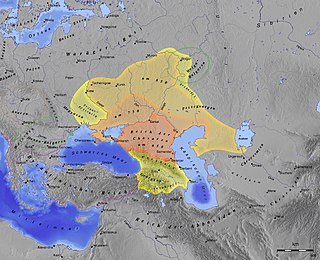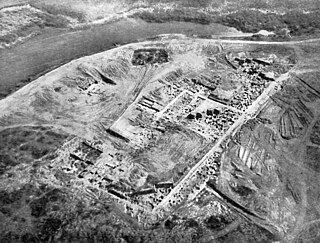Related Research Articles

The Khazars were a nomadic Turkic people that, in the late 6th-century CE, established a major commercial empire covering the southeastern section of modern European Russia, southern Ukraine, Crimea, and Kazakhstan. They created what for its duration was the most powerful polity to emerge from the break-up of the Western Turkic Khaganate. Astride a major artery of commerce between Eastern Europe and Southwestern Asia, Khazaria became one of the foremost trading empires of the early medieval world, commanding the western marches of the Silk Road and playing a key commercial role as a crossroad between China, the Middle East and Kievan Rus'. For some three centuries the Khazars dominated the vast area extending from the Volga-Don steppes to the eastern Crimea and the northern Caucasus.

Sarkel was a large limestone-and-brick fortress in what is now Rostov Oblast of Russia, on the left bank of the lower Don River.
The 730s decade ran from January 1, 730, to December 31, 739.

Year 704 (DCCIV) was a leap year starting on Tuesday of the Julian calendar, the 704th year of the Common Era (CE) and Anno Domini (AD) designations, the 704th year of the 1st millennium, the 4th year of the 8th century, and the 5th year of the 700s decade. The denomination 704 for this year has been used since the early medieval period, when the Anno Domini calendar era became the prevalent method in Europe for naming years.
The Khazar Correspondence is a set of documents, which are alleged to date from the 950s or 960s, and to be letters between Hasdai ibn Shaprut, foreign secretary to the Caliph of Cordoba, and Joseph Khagan of the Khazars. The Correspondence is one of only a few documents attributed to a Khazar author, and potentially one of only a small number of primary sources on Khazar history.
Bulan was a Khazar king who led the conversion of the Khazars to Judaism. His name means "elk" or "hart" in Old Turkic. The date of his reign is unknown, as the date of the conversion is hotly disputed, though it is certain that Bulan reigned some time between the mid-8th and the mid-9th centuries. Nor is it settled whether Bulan was the Bek or the Khagan of the Khazars.
The Schechter Letter, also called the Genizah Letter or Cambridge Document, was discovered in the Cairo Geniza by Solomon Schechter in 1912. It is an anonymous Khazar letter discussing several matters including the wars of the early 940s, involving the Byzantine Empire, the Khazar Khaganate, and Kievan Rus'. Scholars have debated its authenticity.
Joseph ben Aaron was king of the Khazars during the 950s and 960s. Joseph was the son of Aaron II, a Khazar ruler who defeated a Byzantine-inspired war against Khazaria on numerous fronts. Joseph's wife was the daughter of the king of the Alans.
Obadiah was the name of a Khazar ruler of the late eighth or early ninth century. He is described as coming from among "the sons of the sons" of Bulan, but whether this should be taken literally to mean that he was Bulan's grandson, or figuratively to imply a more remote descent, is unclear. King Joseph's Reply claimed that Obadiah strengthened Rabbinic Judaism and Hebrew proficiency in Khazaria by building synagogues and schools and inviting Jewish sages to the country. In Sefer ha-Ittim, Judah ben Barzillai's list of Khazar Jewish kings lacked Obadiah's name, and several scholars have concluded from this that Obadiah was a fictional character. He was succeeded by his son Hezekiah.
A Khazar ruler during the early 10th century CE, Aaron ben Benjamin was the son of the Khazar king Benjamin. Whether Aaron, like the rest of the Bulanids, was a Khagan or a Bek is an unresolved issue.
The Bulanids were the ruling dynasty of the Khazar Khaganate during the 9th century and 10th century CE.
Maslama ibn Abd al-Malik was an Umayyad prince and one of the most prominent Arab generals of the early decades of the 8th century, leading several campaigns against the Byzantine Empire and the Khazar Khaganate. He achieved great fame especially for leading the second and last Arab siege of the Byzantine capital Constantinople.
Hezekiah ben Obadiah was a hypothetical ruler of the Khazars, probably in the mid ninth century CE. He was the son of Obadiah, the descendant of Bulan who brought rabbinical scholars to and built yeshivot in Khazaria. Nothing is known about Hezekiah's reign and the historical authenticity and accuracy of the only document mentioning his name has been questioned. As with other Bulanid rulers, it is unclear whether Hezekiah was Khagan or Khagan Bek of the Khazars, although the latter is more likely.
Menasseh ben Hezekiah was a hypothetical Turkic ruler of the Khazars mentioned in the Khazar Correspondence. He probably reigned in the mid to late ninth century CE. He was the son of Hezekiah, the son of Obadiah. Little is known about his reign. Historical authenticity and accuracy of the only document mentioning his name has been questioned. As with other Bulanid rulers, it is unclear whether he was Khagan or Khagan Bek of the Khazars, although the latter is more likely.
Isaac ben Hanukkah was a hypothetical Jewish ruler of the Khazars mentioned in the Khazar Correspondence. He probably reigned in the mid to late ninth century CE. Little is known about his reign. As with other Bulanid rulers, it is unclear whether Isaac was Khagan or Khagan Bek of the Khazars, although the latter is more likely. He was succeeded by his son Zebulun. Historical authenticity and accuracy of the only document mentioning his name has been questioned.
Zebulun or Zevulun ben Isaac was a hypothetical Jewish Turkic ruler of the Khazars mentioned in the Khazar Correspondence. He probably reigned in the late ninth century CE. Little is known about Zebulun's reign. As with other Bulanid rulers, it is unclear whether he was Khagan or Khagan Bek of the Khazars, although the latter is more likely. Historical authenticity and accuracy of the only document mentioning his name has been questioned.
Menasseh ben Zebulun was a hypothetical Jewish ruler of the Khazars mentioned in some extant editions of the Khazar Correspondence. In some versions he is called Moshe or Moses, but this may be a result of the degradation of the text. He probably reigned in the late ninth century CE. Little is known about his reign. As with other Bulanid rulers, it is unclear whether Menasseh was Khagan or Khagan Bek of the Khazars, although the latter is more likely. Historical authenticity and accuracy of the only document mentioning his name has been questioned.
Aaron ben Nisi was a Jewish ruler of the Khazars mentioned in the Khazar Correspondence. He reigned around the year 900 AD. He was the son of Nisi ben Menasseh. Little is known about his life or reign. As with other Bulanid rulers, it is unclear whether Aaron was Khagan or Khagan Bek of the Khazars, although the latter is more likely.
Rusʹ Khaganate, or kaganate of Rus is a name applied by some modern historians to a hypothetical polity suggested to have existed during a poorly documented period in the history of Eastern Europe between c. 830 and the 890s.
References
- ↑ "Jewish nomads, or was the Khazar Khanate a Jewish State?". 19 March 2019.
- ↑ "История хазар". 23 February 2024.
